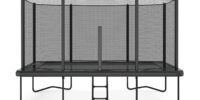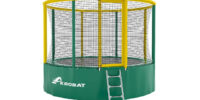Rest after training – 7 tips to restore your body
After exercise, rest is essential for proper muscle recovery and restoration of the body’s energy resources. Its quality determines how quickly we can observe the results of the exercises. Find out what mistakes you should avoid so that your post-workout rest is healthy and helps your body regenerate effectively.
Post-workout rest seems like an obvious and necessary thing to keep the body in balance, but many people don’t factor it into their training schedule. Beginner recreational athletes, hoping for the immediate effects of exercise and rapid weight loss, train tirelessly day after day. Meanwhile, this is the worst mistake you can make.
If there is not enough time for muscle recovery, even the best training plan will not help us stay fit and strong. Achieving a slim and athletic figure requires interweaving short periods of effort with longer periods of rest, and only this training regime is effective and safe for health.

Rest after exercise - what are its functions?
Rest is an important part of your training cycle for several reasons:
it allows to avoid overtraining – a condition where we feel constant fatigue, muscle pain, lack of energy and in which we achieve poorer sports results;
allows you to avoid injuries, the risk of which increases when the body is overloaded;
helps restore the strength and motivation needed for further education;
the so-called supercompensation helps – a phenomenon where the body increases its energy reserves from training to training. This way, our efficiency gradually improves and we get better sports results every time.
What not to do?
In order to recover properly after a workout, you need to know what promotes rapid muscle building and what slows down this process. Sometimes behaviors that seem to benefit an overworked body can actually make it worse. Therefore, it is important to follow some basic rules for post-workout recovery.
Don’t skip stretching
Stretching is part of the so-called cooling exercises, i.e. calming and relaxing the muscles after exercise. Their purpose is to bring the tired body into a calm state. Skipping this step sends the body into shock from suddenly going from a super-fast pace of exercise to a complete stop. This can be manifested, for example, in fainting, venous embolism. What’s more, muscle stretching reduces pain symptoms immediately after exercise and reduces the risk of soreness.
Don’t train the same muscle group day after day
Muscles need 24-48 hours of rest to fully recover. This means that if you train the same muscle group day after day, you run the risk of overtraining. In the long run, instead of getting stronger, the body gets weaker and weaker.
A healthier way is to introduce breaks of at least 1 day between workouts or to use active rest – the type of rest during which we relieve the load of the muscle group trained the previous day and focus on another.
Don’t skip a meal after your workout
Think you can burn more calories by skipping a post-workout meal? This is a mistake! This procedure is very unhealthy because it causes muscle catabolism – that is, the body, which has nothing to restore the lack of energy, burns its own muscles instead of fat.
To avoid this, you need to eat a meal rich in carbohydrates, protein and healthy fats within 2 hours of your workout. It can be, for example, yogurt muesli with nuts and dried fruits or a nutrient-rich smoothie. For a larger meal: lean chicken with whole wheat pasta and salad.
Remember that it doesn’t matter if you train in the morning or in the evening – after every, even late training, you need to eat something.
Don’t reach for high-calorie snacks
Contrary to appearances, eating a fatty and sweet snack after an intense workout does not remain important for the body. Highly processed products such as chips, bars or ice cream do not contain any nutritional value that can be used in the muscle recovery process. These are just empty calories that are stored as fat very easily – and yet fat is the worst enemy of people who exercise to lose weight
Don’t take the night away
Adequate sleep is the key to full recovery after exercise. During sleep, the body “repairs” muscle loss caused by exercise and prepares the body to work even harder. 7-8 hours of sleep is the optimal amount of time needed to wake up refreshed after a workout.
Don’t drink alcohol
Partying with lots of alcohol the day after your workout is definitely a bad idea. Alcohol has several properties that slow down the recovery process after exercise: Alcohol dehydrates the body, makes it difficult to supply muscles with glycogen, removes electrolytes from the body and inhibits the growth of muscle tissue. If you plan to consume more alcohol, do so during a longer break from exercise.
Sauna after training – healthy or not?
Using a sauna can be a good form of relaxation, but only after training with an interval of at least 1-2 days. Then, due to the high temperature, you can count on the effect of reducing muscle pain, relaxing the body and removing harmful toxins.
It doesn’t make much sense to go to the sauna right after a workout if our heart rate hasn’t stabilized yet and our blood pressure is still high. The conditions in the sauna raise blood pressure and strain the cardiovascular system. In addition, intense sweating aggravates the body’s dehydration and depletion of electrolytes in the body, the level of which must be replenished as soon as possible after exercise. As a result, the sauna can slow down the muscle recovery process instead of helping it.


 Eesti
Eesti


